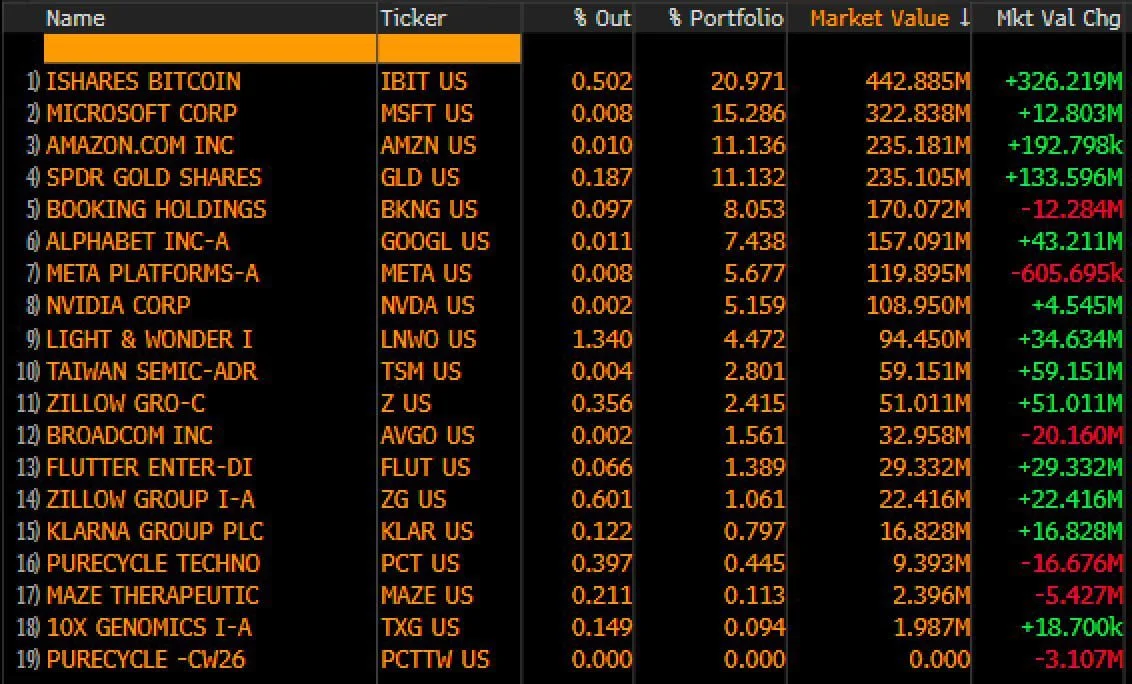Harvard’s Largest Holding is A Bitcoin ETF
Harvard University has made its biggest-ever bet on Bitcoin.
According to Q3 2025 13F filings, Harvard Management Company (HMC) increased its position in BlackRock’s iShares Bitcoin Trust (IBIT) by 257%, bringing its total holdings to 6,813,612 shares valued at $442.8 million.
With this move, Bitcoin has become Harvard’s #1 public-equity position, representing nearly 20% of its $2.1 billion public equities portfolio, surpassing its stakes in Microsoft, Amazon, Alphabet, and Meta.
The university’s endowment, valued at $56.9 billion, also nearly doubled its exposure to gold ETFs, raising its SPDR Gold Shares (GLD) position by 99% to $235 million.
This dramatic shift comes during a period when Bitcoin fell sharply from $114,000 to below $96,000, signaling that Harvard is buying weakness and positioning BTC as a long-term strategic asset, not a speculative trade.
Other institutions are doing the same: Emory University also increased its Bitcoin ETF position during the quarter, indicating a broader trend of academic endowments moving into digital assets.
Key Highlights
Harvard’s IBIT position is now its single-largest holding.
20% of its entire public-equity portfolio is now allocated to Bitcoin.
IBIT position grew 257% in Q3 2025, adding $326.2 million in new exposure.
Total Bitcoin ETF holdings: $442.8 million
Gold ETF holdings surged 99% to $235 million, reinforcing a shift into hard assets.
Harvard is buying during a significant Bitcoin price correction, signaling high conviction.
A Timeline of Harvard’s Historical Views & Actions on Bitcoin
Although Harvard has not traditionally made direct public claims about Bitcoin, its institutional behavior and academic commentary create a clear timeline.
2017–2018: Academic Skepticism, Not Yet Institutional
Harvard economists and professors frequently warned about Bitcoin volatility.
For example, Harvard economist Kenneth Rogoff argued that Bitcoin’s value was “more likely to be $100 than $100,000 in the long run,” referencing concerns about speculative behavior.
Meanwhile, the Harvard Business School and SEAS engineering programs began incorporating blockchain research into their curricula.
2019: First Indirect Crypto Exposure via Venture Funds
Harvard became one of the first universities to invest in crypto indirectly through:
Andreessen Horowitz’s a16z Crypto Fund
Paradigm
This was documented in SEC filings and reported by The Information and CNBC in 2019.
2023–2024: Bitcoin ETF Approval Opens the Door
The approval of U.S. spot Bitcoin ETFs in 2024 created a trusted, regulated vehicle that matched Harvard’s compliance requirements. HMC began referencing alternative stores of value in its investment philosophy.
Q2 2025: Harvard Buys Bitcoin for the First Time
Harvard’s 13F filings revealed its first-ever Bitcoin ETF purchase.
This was small but symbolically meaningful marking Harvard’s official entry into digital assets.
Q3 2025: The Breakthrough - Harvard Goes All-In
Harvard’s Q3 filing shows:
257% increase in IBIT
Total exposure: $442.8M
Now Harvard’s top holding (20% of public equities)
This is the most aggressive institutional Bitcoin accumulation by a U.S. university to date.
Why Harvard’s Bitcoin Bet Matters
1. A Turning Point in Institutional Adoption
Harvard is among the world’s most conservative, sophisticated asset managers.
A 257% increase during a price correction signals that Bitcoin has crossed a major legitimacy threshold.
Endowments typically move in slow waves. Harvard’s move sets a precedent for:
Yale
Stanford
MIT
Princeton
State pension funds
They now have a clear, audited example of Bitcoin ETF allocation at massive scale.
2. Bitcoin Officially Enters “Hard Asset” Status
By simultaneously increasing:
Bitcoin ETF holdings by 257%
Gold ETF holdings by 99%
Harvard is positioning BTC alongside gold as part of a long-duration inflation hedge strategy.
This aligns with macro themes:
currency debasement
sovereign debt concerns
rising geopolitical instability
Bitcoin is increasingly seen as “digital gold with asymmetric upside.”
3. Buying the Dip = Long-Term Thesis, Not Speculation
Harvard made its largest Bitcoin purchase while the asset fell from $114k → under $96k.
This is classic endowment investing:
accumulate during volatility
ignore short-term noise
focus on long-duration returns
This suggests Harvard views Bitcoin as structurally undervalued during the quarter.
4. IBIT Becomes the Gold Standard for Institutional BTC Access
BlackRock’s IBIT is now:
The world’s most popular spot Bitcoin ETF
The preferred vehicle for institutional allocators
Harvard’s massive ETF allocation validates the ETF model and reinforces the shift away from:
crypto exchanges
private custody
venture tokens
Endowments prefer regulated structures.
Broader Market Implications
Harvard’s move may trigger:
Endowment domino effect: other universities will follow.
Pension fund entry: the largest pools of capital move last.
Hard asset renaissance: Bitcoin + Gold allocation synergy.
ETF flow acceleration: institutions prefer IBIT/Fidelity FBTC.
This marks one of the most significant Bitcoin adoption moments since Tesla and MicroStrategy.

